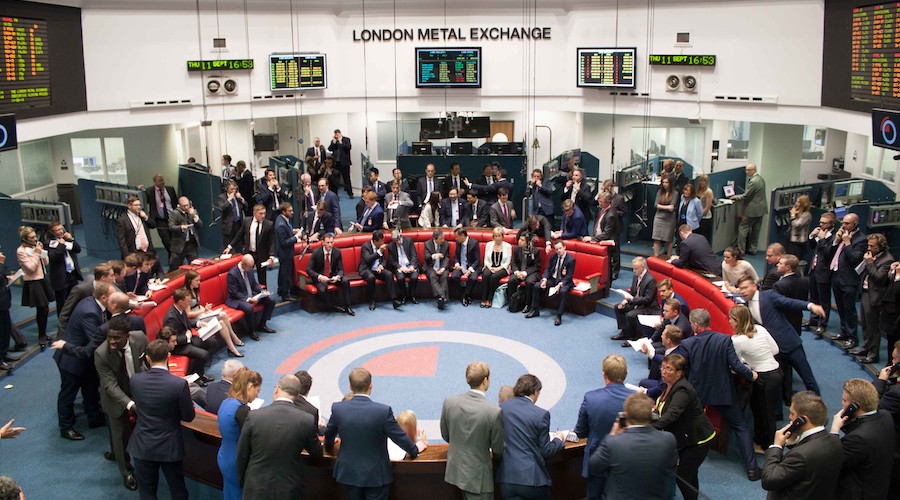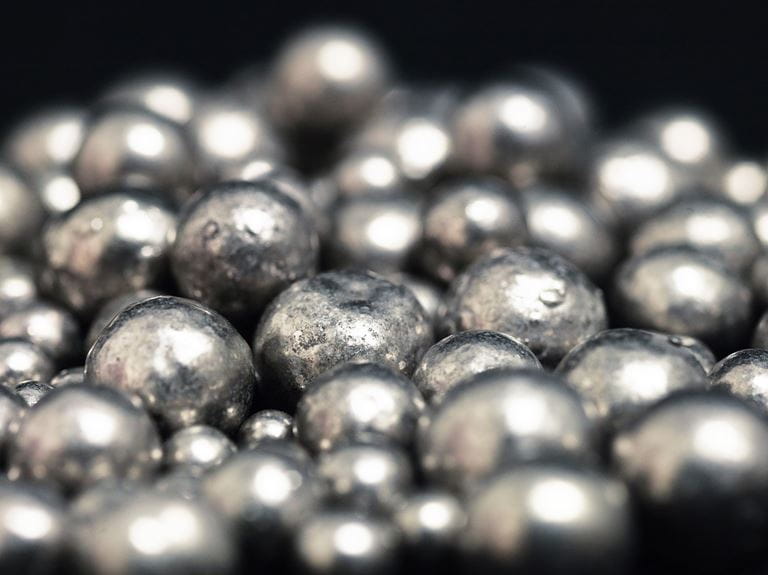LME fights to regain trust after last year’s nickel crisis
Bloomberg News | May 16, 2023 |
London Metal Exchange. (Image by HM Treasury, Flickr.)
The embattled London Metal Exchange is still trying to rebuild faith in its nickel contract after an epic short squeeze last year, according to chief executive officer Matthew Chamberlain.

The crisis last March, when the metal used in stainless steel and electric vehicle batteries spiked 250% in little more than 24 hours, brought the venerable LME to the brink of collapse. It raised doubts about the exchange’s viability as the world’s benchmark pricing mechanism for nickel and was followed by plunging trading volumes and frequent wild price swings.
“Every day, every week, every month you are competing for people’s confidence,” Chamberlain said in a Bloomberg TV interview in Hong Kong. “Trust doesn’t arise overnight, but I really hope people feel that we are doing the right things to strengthen this.”
The LME didn’t restart nickel trading in Asian hours, the time in which prices jumped most dramatically, until this March, a year after the crisis.
“It was such an important step to be able to reopen nickel trading in Asian hours,” Chamberlain told reporters at LME Asia Week in Hong Kong on Tuesday. “Because we know how important this time zone, this geography is to all of our metals, particularly nickel,” he said at the exchange’s first in-person event in Asia since 2019.
The LME has made a number of changes to its rules since the crisis, including imposing daily price limits, and is proposing more changes to its nickel operations. It’s also facing a rare investigation from the UK’s Financial Conduct Authority over its handling of the debacle, and lawsuits from hedge funds.
Nickel is still the worst-performing contract on the LME so far this year. It’s fallen by 28%, compared with drops of around 2% for copper and 5% for aluminum.
April was probably the best-volume month for the exchange in well over a year, Chamberlain said in the TV interview.
“There’s a lot of interest in base metals and people are still trying to figure out where it’s going to go,” he said. “But in many ways that’s a good place to be because it means people want to hedge, they want to express an opinion. And that’s obviously all great for the exchange and our community.”
Bloomberg News | May 16, 2023 |

London Metal Exchange. (Image by HM Treasury, Flickr.)
The embattled London Metal Exchange is still trying to rebuild faith in its nickel contract after an epic short squeeze last year, according to chief executive officer Matthew Chamberlain.

The crisis last March, when the metal used in stainless steel and electric vehicle batteries spiked 250% in little more than 24 hours, brought the venerable LME to the brink of collapse. It raised doubts about the exchange’s viability as the world’s benchmark pricing mechanism for nickel and was followed by plunging trading volumes and frequent wild price swings.
“Every day, every week, every month you are competing for people’s confidence,” Chamberlain said in a Bloomberg TV interview in Hong Kong. “Trust doesn’t arise overnight, but I really hope people feel that we are doing the right things to strengthen this.”
The LME didn’t restart nickel trading in Asian hours, the time in which prices jumped most dramatically, until this March, a year after the crisis.
“It was such an important step to be able to reopen nickel trading in Asian hours,” Chamberlain told reporters at LME Asia Week in Hong Kong on Tuesday. “Because we know how important this time zone, this geography is to all of our metals, particularly nickel,” he said at the exchange’s first in-person event in Asia since 2019.
The LME has made a number of changes to its rules since the crisis, including imposing daily price limits, and is proposing more changes to its nickel operations. It’s also facing a rare investigation from the UK’s Financial Conduct Authority over its handling of the debacle, and lawsuits from hedge funds.
Nickel is still the worst-performing contract on the LME so far this year. It’s fallen by 28%, compared with drops of around 2% for copper and 5% for aluminum.
April was probably the best-volume month for the exchange in well over a year, Chamberlain said in the TV interview.
“There’s a lot of interest in base metals and people are still trying to figure out where it’s going to go,” he said. “But in many ways that’s a good place to be because it means people want to hedge, they want to express an opinion. And that’s obviously all great for the exchange and our community.”
Bloomberg News | May 12, 2023 |

Credit: LME
The London Metal Exchange is tightening rules for handling nickel by its network of warehouses, following the shock discovery earlier this year that some of its nickel contracts were instead backed by bags of stones.

The LME will now require warehouse companies to carry out additional checks in an attempt to prevent a repeat of the scandal, according to people familiar with the matter. The tests include using magnets and metal detectors to ensure that the bags do in fact contain metal, and a so-called “touch inspection,” which involves warehouse workers feeling the outside of the bags to verify that the material inside is an appropriate size and shape.
The changes come two months after the exchange discovered that 54 tons of “nickel” held at a warehouse in Rotterdam and owned by JPMorgan Chase & Co. was actually just bags of stones. While the amounts involved were small, the incident shook traders’ faith in the LME, whose contracts have long been seen as unquestionably safe in an industry where fraud and theft are commonplace.
At the heart of the case is a quirk specific to the nickel market: unlike aluminum and copper, which are kept in neat stacks in warehouses, most of the nickel in the LME is in the form of briquettes stored in bags. It is typically only weighed by warehousing companies once: when it first enters their warehouse. That meant that the existence of the bags of stones at the Rotterdam warehouse was able to go undetected for a significant period of time.
The warehousing company, Access World, believes it’s likely that someone snuck into the warehouse at some point after the bags were first delivered, several years ago, and replaced the nickel with stones. The heist was only noticed when the bags had been sold, delivered out and were inspected upon their arrival elsewhere.
The changes mandated by the LME, which only cover nickel stored in bags and were communicated to warehousing companies in recent days, seek to reduce the chances that the incident could be repeated.
The exchange will require warehouses to carry out additional checks when bags of nickel are delivered in. It will also require them to carry out certain checks when bags of nickel are “warranted” (registered for delivery on the exchange) and when they are “rewarranted” (registered again, after previously having been deregistered).
Finally the exchange is asking warehouses to weigh bags of nickel as they are delivered out of the LME system — a final check to ensure the trustworthiness of the system and to prevent traders getting a nasty surprise when metal they bought on the LME turns out to be the wrong weight, as happened to Trafigura Group and Stratton Metals with “nickel” from the Access World Rotterdam warehouse.
An LME spokesperson confirmed the exchange is putting in place “enhanced operating procedures for bagged products in LME-licensed warehouses,” and said the LME is committed to continuing to evolve its procedures to ensure the future robustness of its physical storage network.
(By Jack Farchy and Archie Hunter)

No comments:
Post a Comment